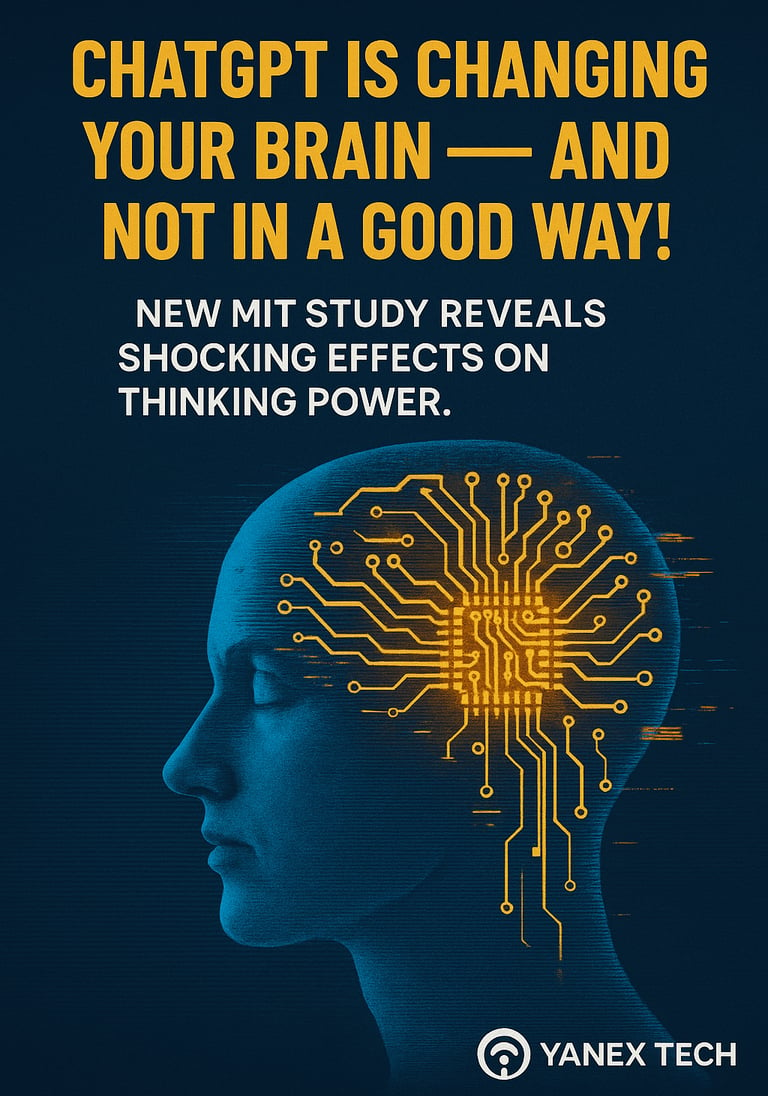Does Using AI Affect Your Brain Performance?
Does Using AI Affect Your Brain Performance? Artificial Intelligence (AI) has become deeply integrated into our daily lives — from writing assistance and research to automating complex tasks. But as our dependence on AI tools grows, researchers are beginning to ask an important question: Is AI changing the way our brains work? What MIT’s Study Found A recent study by researchers at the Massachusetts Institute of Technology (MIT) titled “Your Brain on ChatGPT: Accumulation of Cognitive Debt When Using an AI Assistant for Essay Writing Task” explored how using AI affects brain activity. The experiment involved 54 adults aged 18 to 39, divided into three groups. Each group was asked to write four essays over a period of four months — using either: ChatGPT, a traditional search engine (like Google or Yahoo), or their own knowledge without any digital tools. During the first three essays, the participants who used ChatGPT showed lower electrical brain connectivity compared to the other two groups. Even those using search engines had less brain activity than participants relying purely on their own thinking. In the final phase, the groups switched methods — the ChatGPT users wrote without AI, while the non-AI group used ChatGPT. Results showed that those who had been using ChatGPT displayed: Noticeably lower brain connectivity, Weaker recall of information from their essays, and A reduced sense of ownership over their written work. Although the study provides fascinating insights, it was small and preliminary — with only 18 people completing the final task — and has yet to undergo formal peer review. Still, it raises meaningful questions about how AI influences our thinking. Other Research on AI and Critical Thinking MIT isn’t alone in exploring this topic. Several recent studies have examined how regular use of AI may influence critical thinking and cognitive performance. A 2025 study suggested that frequent AI users — particularly those aged 17 to 25 — may experience a decline in independent problem-solving skills. Researchers called this “cognitive offloading”, meaning that individuals start relying on AI systems to think, analyze, and decide on their behalf. Another study from 2025 found that AI may shift human thinking patterns from active reasoning to passive understanding in several key ways: Recall and comprehension: Moving from collecting knowledge to simply verifying information. Application: Replacing real-world problem-solving with integration of AI-generated responses. Analysis and evaluation: Shifting from performing tasks to overseeing AI’s output. Potential Long-Term Effects A 2024 research review highlighted the risks of overreliance on AI for tasks that require deep thought and creativity. Some of the potential long-term effects include: Reduced mental engagement and focus Neglect of essential cognitive skills (like calculation and recall) Decline in memory and retention ability Shorter attention spans Difficulty applying knowledge in new situations Increased social isolation and decreased human-to-human interaction Lower self-confidence and motivation Finding the Right Balance While AI can boost productivity and simplify complex work, how we use it matters. The key is to treat AI as a supporting tool, not a replacement for human thought. Using it thoughtfully — for brainstorming, guidance, or enhancing creativity — can keep your mind sharp while still taking advantage of its power. Takeaway AI is transforming how we think, learn, and create — but it’s important to maintain a healthy balance. Overreliance on AI may dull our critical thinking, while mindful use can expand our potential. The future of human intelligence will depend not just on how advanced AI becomes, but on how wisely we choose to use it.
ARTIFICIAL INTELLIGENCE
Fatima Yaseen
10/30/20251 min read


